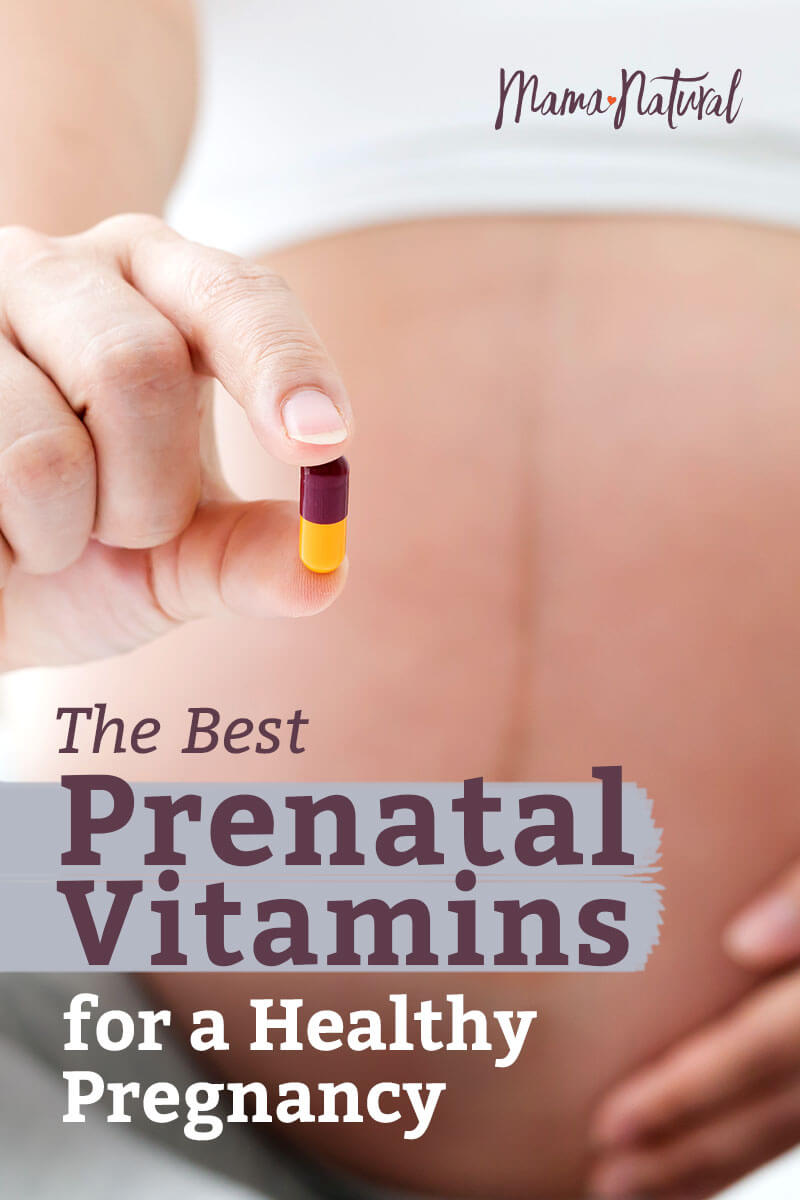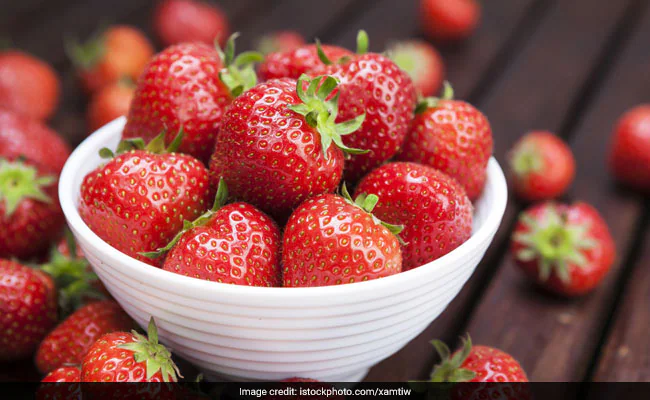Not all prenatal vitamins are created equal. Find out which ones are best for you based on your health and lifestyle.
Baby will take what the nutrients they need from you, whether you have enough to spare or not. Because of this, it's vital to get enough nutrients for you andfor your growing baby. Unfortunately, many moms begin pregnancy deficient in one or more vitamins or minerals, so prenatal vitamins become especially important. The problem? Not all prenatal vitamins are created equally. Read on to find the best prenatal vitamins for you.
Best Prenatal Vitamins: Food-based Prenatals
Food-based prenatals are more absorbable and gentler on the stomach, because they are derived from food instead of isolated vitamins. In fact, many women who suffer from constipation or nausea while on conventional prenatal vitamins during pregnancy see a significant improvement when switching to food-based prenatals. Because they are derived from food, these prenatal blends contain the enzymes, phytonutrients, and other co-factors that make the vitamin most absorbable and add to the spectrum of nutrition. Many also include probiotics and herbal blends, too.
The downside to food based prenatals is that they are more expensive and have lower levels of each vitamin and mineral than a synthetic vitamin. However, because theyare thought to be more highly absorbable than synthetics, this isn't a deal-breaker.
Here's a comparison of food-based prenatals:
MegaFood Baby & Me Prenatal Vitamins
MegaFood – Baby & Me prenatal supplement facts
MegaFood offers two versions of its prenatal blend: Baby & Me and Baby & Me 2 (doesn't contain the herbal blend).
This company has high quality standards—their prenatal vitamins are non-GMO, contain no pesticides/herbicides, and are made from farm-fresh food.
They contain a great cross-spectrum of nutrients, are higher in vitamin D, contain vitamin K, and have lots of good B vitamins. Plus, they're strong in iodine, iron and zinc, three important minerals in pregnancy. It is lower in vitamin A, but that shouldn't be a problem if you take cod liver oil. It's also low in calcium and magnesium—try supplementing with organic, grass-fed dairy and magnesium.
New Chapter Perfect Prenatals
New Chapter Perfect Prenatals supplement facts
Perfect Prenatal is gluten-free, non-GMO, and made from organic foods. It is strong in vitamin D, K and iron. Unfortunately, it doesn't reach the RDA in zinc, iodine, calcium, magnesium, or surprisingly, folate (probably the most important nutrient when pregnant). It also contains soy, which is a high-allergen food, even when fermented. Still, I know many moms who swear by this prenatal, and I do like how it includes probiotics and a sprout blend.
Garden of Life Organic Prenatal
Garden of Life Organic Prenatal – Best Prenatal Vitamins Food-based Prenatals pregnancy post by Mama Natural
Garden of Life Organic Prenatal is also a non-GMO, food-based, Kosher prenatal vitamin, but it's also vegan! Unlike New Chapter Perfect Prenatals, Garden of Life Organic Prenatals are rich in folate — 600mg to be exact. Although this formula is a vegan formula, it delivers 100 percent of mama's iron and iodine needs as well as 50 percent of the daily recommendation of manganese. These are three things that most other vegan formulas do not offer. Here's another good reason to consider this prenatal: it's a once-per-day formula!
Vitamin Code Raw Prenatal
Garden of Life Vitamin Code RAW Prenatal Supplemental Facts
Vitamin Code is another popular food-based prenatal. It is non-GMO, contains no fillers, and is processed at low heat for optimal nutrient retention. It is strong in vitamin C, iodine, iron, and all of the vitamin Bs. It contains double the vitamin D3 of most prenatals, but it is lower in vitamin K, which can be problematic for good calcium absorption. It's also lower in zinc and copper, important trace minerals.
Some moms can't take this formula because they are allergic to one of the many food ingredients, like seeds and grains. Another drawback is that you have to take this prenatal vitamin three times per day—a definite inconvenience for some. Find them here.
Prenatal Vitamins for Moms Who Have the MTHFR Mutation
The MTHFR defect, which some say affects up to 50-60 percent of the population, makes it difficult for your body to convert folic acid (and even folate) into a usable form (called methylation). Because folate deficiencies are associated with some birth defects such as spina bifida and neural tube defects, it's vital to know if you have the MTHFR mutation and, if so, to take the right form of prenatal when you are pregnant.
Luckily there are prenatal blends designed especially for women who have the MHTFR mutation.
MTHFR Prenatal: Seeking Health
MTHFR Seeking Health Optimal Prenatal
This prenatal was created by one of the world's MTHFR experts, Dr. Ben Lynch. It contains methylfolate and folinic acid, which are especially great for women who can't process folic acid or even folate.It also contains methylcobalamin and adenosylcobalamin, absorbable forms of B12 for those with the MTHFR defects.This prenatal is also very high in all vitamins and minerals and even includes some helpful foods and herbs.
The biggest problem with this prenatal is that it doesn't contain any iron—add Megafood Blood Builder or Liver Pills for iron. And because it's not food based, it may be harder for the body to absorb all of its nutrients. Find them here.
MTHFR Prenatal: Thorne Research
Thorne Research prenatal supplement facts
As shown above, this prenatal blend includes methylated folate instead of folic acid. It also contains a lot of iron, which can be irritating for some moms and contains significantly less vitamin B6 than the label states. And according to Lab Door's research, it contains 99 percent less vitamin B6 as is stated on the label, so an additional B supplement may be needed. Find it here.
MTHFR Prenatals: Zahler Prenatal + DHA
Zahler Prenatal + DHA prenatal supplement facts
These prenatals contain methylated folate, which is more easily assimilated into the body. And the added DHA helps baby's eyes and brain develop. Another plus for some: This blend doesn't contain herbs. Find them here.
MTHFR Prenatals: Dr. Ron's
Dr Rons MTHFR Prenatals
Though not a prenatal, this multivitamin contains methylated forms of B vitamins and is super high in important minerals like calcium, magnesium, selenium, and iodine. It also contains antioxidants from grape seed extract.
However, this supplement is not food-based and doesn't include all of the natural co-enzymes, co-factors, and bioflavonoids found in food-based vitamins and minerals. It also may be harder to absorb and cause some stomach upset. Be sure to take this prenatal vitamin with food. It's also lacking vitamin A and iron, two important nutrients when pregnant. Find them here.
Pregnant? Get my FREE week-by-week updates! – Week by Week Promo [In-article]
Track your baby's growth, find safe and natural remedies, and have fun along the way!
https://wk2wk.securechkout.net
Create Your Own Prenatal Vitamins
You can also create your own prenatal vitamins based on your particular biological needs.
Some moms do blood and/or hair tissue mineral analysis to see specifically which nutrients they may need more of and which minerals they don't need to supplement with. Obviously, not everyone can afford or access this kind of personalized testing, but hopefully this will be the medical norm one day.
If you do create your own, make sure it includes folate, magnesium, iodine, zinc, iron, plus vitamins A, D, C, K, and B. It's also a good idea to include a good probiotic for gut health. By boosting your good bacteria levels, you may ward off things like Group B Strep and thrush when breastfeeding. You may also help colonize your baby with the best bacteria possible, which can affect her health for the rest of her life.
What About Synthetic Prenatal Vitamins?
These are the ones you can get at most drug stores. They are a complete cross-spectrum of nutrients,but they are created in a laboratory with vitamin isolates separated from the natural co-factors like phytonutrients that help your body absorb or utilize the vitamin.
These synthetic vitamins are shown to be nutritionally inferior to natural vitamins and can cause digestive issues.
- Synthetic vitamin E can be especially problematic. Research has linked synthetic vitamin E to DNA damage to the liver, prostate cancer in men, and congenital heart defects in babies born to women taking large doses of vitamin E.
- And while beta-carotene is an important precursor to vitamin A, it's synthetic form can cause problems. Researchers found that high amounts of synthetic beta-carotene may actually block some of the mechanisms of vitamin A in the body.
Whole, natural foods contain avariety of vitamins,minerals, and phytonutrients that work together to be absorbed and utilized. When vitamins are isolated like they are in synthetic vitamin blends, your body may utilize some of thevitamins but deplete others.
Why Do I Need Prenatal Vitamins?
Growing a baby is tough work. Baby will take what he needs, whether or not you have much to give. To avoid losing your own stores of nutrients, you have to get enough vitamins and minerals for both of you. Here are the most common vitamins and minerals in prenatal vitamins and an overview of what they do in the body:
- Vitamin A: Supports eye and brain development, respiratory development
- Thiamin (Vitamin B1): Supports the nervous system, supports baby's brain development
- Riboflavin (Vitamin B2):Supports healthy eyes and skin
- Niacin (Vitamin B3): Supports the digestive, integumentary, and nervous systems
- Pantothenic (Vitamin B5):Helps to create hormones and may ease leg cramps
- Vitamin B6: Helps form red blood cells and may help with morning sickness
- Biotin (Vitamin B7):Works with other B vitamins to help release energy from food
- Folate/ Folic Acid (Vitamin B9): Prevents neural tube defects and Spina Bifida in baby
- Vitamin B12: Promotes blood formation and helps prevent birth defects that affect the spine and central nervous system
- Vitamin C: Helps your body absorb iron and protects against the effects of stress
- Vitamin D:Helps strengthen bones and teeth, plus helps your body utilize calcium and phosphorus
- Vitamin E: Promotes overall wellness and metabolism, plus may help reduce miscarriages
- Vitamin K: Supports healthy bone formation, blood clotting, and healing
- Calcium: Supports bone development
- Copper: Plays a role in iron metabolism and supports blood health
- Iron: Helps the blood carry oxygen
- Iodine:Supports healthy thyroid function, metabolism, fetal growth, and hearing
- Magnesium: Supports healthy blood pressure and healthy birth weight
- Zinc: Supports immune, nerve, and muscle function
Is Cod Liver Oil Safe?
There are some concerns around vitamin A during pregnancy. While some birth defects have been associated with vitamin A, those studies assessed the effects of large amounts of the synthetic form of vitamin A versus what is naturally found in cod liver oil and beef liver.
Women have been eating liver and cod liver oil (and giving it to their kids) for thousands of years, many times under their doctor's orders.What's more? Studies suggest cod liver oil could be great for a variety of ailments, from arthritis to cognitive performance. It only makes sense that those potential benefits would continue during pregnancy. Of course, you should check with your midwife or OB-GYN to see what's best for you during your pregnancy.
Good for Mama, Good for Baby
No matter which road you take with your prenatal, the important thing is to flood your body with a cross-spectrum of nutrients through supplements and diet. This is especially true if it is your second, third, or fourth pregnancy, when nutritional reserves may be lower than the first time around.
If you plan on breastfeeding, many midwives will recommend continuing on your prenatal for the entire duration of breastfeeding. In fact, since 50 percent of pregnancies are unplanned, all women of childbearing age might consider taking a prenatal vitamin.
Take the extra time and expense to feed yourself well during these critical child-bearing years. It will pay off with greater health and vitality for you and your family!
How About You?
Which prenatal did you take while pregnant? Did you feel good on? Share with us!
References
- https://www.rxlist.com/folic_acid/supplements.htm
- https://www.sciencedirect.com/science/article/pii/S1369848613001349
- https://www.organicconsumers.org/news/nutri-con-truth-about-vitamins-supplements
- https://www.westonaprice.org/health-topics/dietary-supplements-what-the-industry-does-not-want-you-to-know/
- http://mthfrliving.com/health-conditions/preparing-pregnancy-mthfr-mutations/
- https://www.webmd.com/baby/guide/prenatal-vitamins
- https://www.webmd.com/vitamins-supplements/ingredientmono-902-copper.aspx?activeingredientid=902&activeingredientname=copper
- https://www.ncbi.nlm.nih.gov/pubmed/24696187
- https://academic.oup.com/ajcn/article/71/5/1325S/4729494
- https://labdoor.com/rankings/prenatal-vitamins
- Share
- Pin
- Tweet
- Email
- Text






















 Guava is much higher in Vitamin C content than an orange.
Guava is much higher in Vitamin C content than an orange.  Pineapple can work wonders for your diet.
Pineapple can work wonders for your diet.  Strawberries are powerful antioxidants as well.
Strawberries are powerful antioxidants as well. 
 Mangoes are naturally high in Vitamin C content.
Mangoes are naturally high in Vitamin C content. 
 Apart from being generally beneficial, broccoli stocks up on Vitamin C too.
Apart from being generally beneficial, broccoli stocks up on Vitamin C too. 
 Bell peppers can be amazingly high in Vitamin C content.
Bell peppers can be amazingly high in Vitamin C content. 